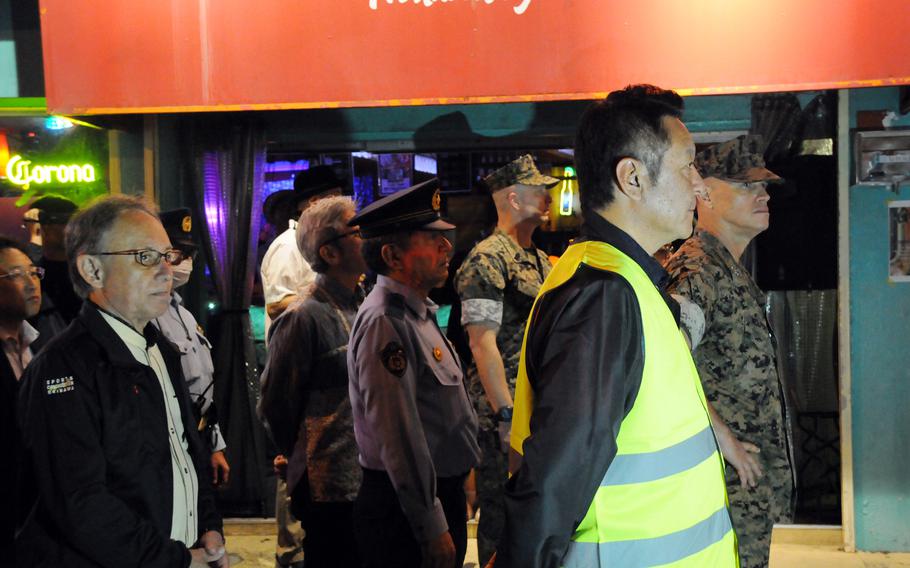Marine Corps
Okinawa governor questions US military police arrests during joint patrol
Stars and Stripes August 25, 2025

Okinawa Gov. Denny Tamaki, far left, joins a U.S.-Japan patrol of Gate 2 Street in Okinawa city, Okinawa, April 18, 2025. (Keishi Koja/Stars and Stripes)
Okinawa Gov. Denny Tamaki has accused U.S. military police of failing to coordinate with Okinawa authorities before taking nine Marines into custody on an Okinawa city street during a joint patrol this month.
However, spokesmen for U.S. Forces Japan and the city’s Base Policy Division say no such coordination is required.
Tamaki on Friday said that he will consult with the city, prefectural police and Japan’s Ministry of Foreign Affairs about the “future form of these joint patrols,” according to video of his regular press conference that day.
“We are confirming with the Ministry of Foreign Affairs and the U.S. military what the basis for the recent arrests were under the Japan-U.S. Status of Forces Agreement,” he said. “We intend to respond appropriately based on that.”
During a patrol in the early hours of Aug. 16, three Marines in the city’s nightlife district were arrested, fingerprinted and entered into the provost marshal’s database for “alleged violations of the Uniform Code of Military Justice,” Marine Corps Installations Pacific spokeswoman 1st Lt. Kelsey Enlow said by phone last week.
Another six were detained by military police after they refused to provide identification, became aggressive or tried to flee, she said.
USFJ’s spokesman, Air Force Col. John Severns, acknowledged Tamaki’s statements but said U.S. military police are not required to contact Japanese police before arresting individuals with SOFA status off base.
The agreement establishes the rights, privileges and responsibilities of U.S. service members, civilian Defense Department employees and their families in Japan. It also governs their relationship in matters of criminal jurisdiction.
According to the Agreed Views on Criminal Jurisdiction — a SOFA clarification agreed upon by the U.S. and Japan — such arrests are a “function of the United States Forces law enforcement.”
“The question that’s been raised is do we have the ability to arrest military members when they are off base, and the answer is yes, we do,” Severns said by phone Monday.
The United States has jurisdiction over individuals who commit offenses that are punishable only under U.S. military or civilian law, according to SOFA.
Offenses committed against another SOFA member, U.S. security or property, or offenses committed during the performance of official duties fall under U.S. jurisdiction. In all other cases, local authorities have jurisdiction.
For any off-base incidents, U.S. military police defer first to Japanese authorities before taking action, Maj. Gen. Brian Wolford, commander of Marine Corps Installations Pacific, told reporters during an Aug. 18 roundtable at Camp Foster.
“Many times, for the low-level stuff, they’ll cede jurisdiction and tell us to take care of it because we can handle it instead of them,” he said. “The beauty of the joint patrol [is that] with our law enforcement and their law enforcement, it’s a mutual discussion on the best way to handle the situation.”
U.S. military police carry out enforcement efforts during joint patrols and are not required to give prior notification to the city, a spokesman for Okinawa city’s Base Policy Division said by phone Monday. Some Japanese government officials may speak to the media only on condition of anonymity.
During joint patrols, U.S. law enforcement “in principle” will take custody of any service member who commits an offense, Hitoshi Asato, former director of the Okinawa Prefectural Police’s Criminal Affairs Division, said during a special committee meeting of the prefectural assembly in July 2024.
The nine Marines were released later that morning to their commands, which will determine possible charges, Enlow said.
They were among at least 25 service members who were stopped that night for violating liberty rules, which were modified by USFJ in September to prohibit troops from being in a drinking establishment or consuming alcohol publicly after 1 a.m.